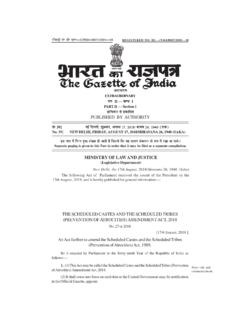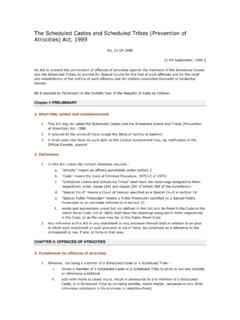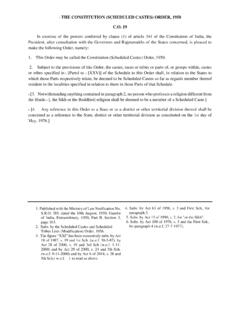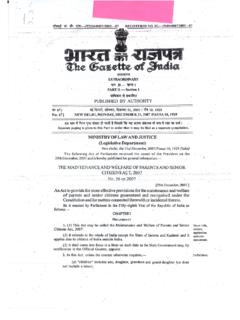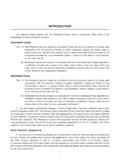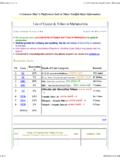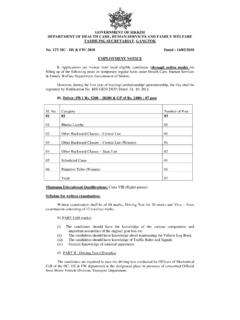Transcription of No. 35/1/72-R.U. (SCT.V) Government of …
1 No. 35/1 ( ) Government of India/Bharat Sarkar Ministry of Home Affairs/Grih Mantralaya New Delhi-110001, Dated, the 2nd May 1975 12 Vaisakha, 1897 To The Chief Secretaries of all State Governments and Union Territory Administration. Subject: Issue of scheduled castes and scheduled Tribes Certificate Sir, I am directed to state that complaints are often received that scheduled Caste and scheduled Tribe certificates are given to persons who do not in fact belong to a scheduled Caste or scheduled Tribe. It is necessary, therefore, that the Certificate issuing authorities should make a proper verification before they actually issue such a certificate. 2. In this connection a set of points which should be taken into account are enclosed for the guidance of those empowered to issue scheduled Caste and scheduled Tribe certificates.
2 It is requested that these instructions may be circulated amongst them. Yours faithfully, Sd/- (O. K. MOORTHY) Director General, BCW. No. 35/1 ( ), Dated New Delhi, the 2nd May 1975/12 Vaisakha, 1975 Copy forwarded for necessary action to:- 1. All Ministries/Departments of the India. 2. All attached and subordinate offices of 3. The Union Public Service Commission, Dholpur House, New Delhi-110011. 4. The Dept. of Personnel and Administrative Reforms, Estt. (SCT) Section, New Delhi. 5. The Commissioner for scheduled castes and scheduled Tribes, Ramakrishnapuram, New Delhi. Sd/- (O. K. MOORTHY) Director General, BCW Enclosure to circular letter No.
3 No. 35/1 ( ), Dated, the April l 975/ Vaisakha,1897 Issue of scheduled caste and Tribe Certificate Points to be observed. 1. General: (Applicable in all cases) Where a person claims to belong to a scheduled Caste or a scheduled Tribe by birth it should be verified: -- (i) that the person and his parents actually belong to the community claimed; (ii) that this community is included in the Presidential Orders specifying the scheduled castes and scheduled Tribes in relation to the concerned State (iii) that the person belongs to that State and to the area within that State in respect of which the community has been scheduled ; (iv) if the person claims to be a scheduled castes , he should profess either the Hindu or the Sikh religion.
4 (v) if the person claims to be a scheduled Tribe, he may profess any religion. 2. Cases of migration; (i) Where a person migrates from the portion of the State in respect of which his community is scheduled to another part of the same State in respect of which his community is not scheduled , he will continue to be deemed to be a member of the scheduled Caste or the scheduled Tribe, as the case may be, in relation to that State; (ii) Where a person migrates from one State to another, he can claim to belong to a scheduled Caste or a scheduled Tribe only in relation to the State to which he originally belonged and not in respect of the State to which he has migrated.
5 3. Claims through marriage: The guiding principle is that no person who was not a scheduled Caste or a scheduled Tribe by birth will be deemed to be a member of a scheduled Caste or a scheduled Tribe merely because he or she had married a person belonging to a scheduled Caste or a scheduled Tribe. Similarly a person who is a member of a scheduled Caste or a scheduled Tribe would continue to be a member of that scheduled Caste or scheduled Tribe as the case may be, even after his or her marriage with a person who does not belong to a scheduled Caste or a scheduled Tribe. 4. Cases of conversion and re-conversion: (i) Where a scheduled Caste person gets converted to a religion other than Hinduism or Sikhism and then reconverts himself back to Hinduism or Sikhism, he will be deemed to have reverted to his original scheduled Caste, if he is accepted by the members of that particular caste as one among them.
6 (ii) In the case of a descendent of a scheduled Caste convert, the mere fact of conversion to Hinduism or Sikhism will not be sufficient to entitle him to be regarded as a member of the scheduled Caste to which his forefathers belonged. It will have to be established that such a convert has been accepted by members of the caste claimed as one among themselves and has thus become a member of that caste. 5. Cases of adoption: Great care has to be exercised in dealing with cases where a person claims to be a scheduled Caste on the ground that he has been adopted by a scheduled Caste person. The validity of the adoption has to be clearly established before any caste certificate can be given.
7 It is for the party to prove his claim by cogent and reliable evidence. (i) The requirements of valid adoption are given in section 6 to 11 of the Hindu Adoption and Maintenance Act, 1956 (relevant extracts of which are attached). The actual giving and taking of the child in adoption is a mandatory requirement and thereafter the adopted child is deemed to be the child of his adoptive father or mother for all purposes and the child severs all ties with the family of his or her birth. Ordinarily, no child who has attained the age of 15 years or who is married can be given in adoption unless there is a custom or usage applicable to the parties. (ii) In deciding whether an adoption is valid, the certificate issuing authority should satisfy himself that all the requirements of Law have been complied with.
8 He should also take into account the behaviour of the child after adoption whether he physically lives with and is supported by his adoptive parents and receives no financial help from his original parents. In case these conditions are not satisfied, the certificate should be refused. (iii) Where the case relates to an adoption of a married person or of a person of the age of 15 years and above, the certificate shall be required to be given by the District Magistrate who shall, after making due enquiries as to the validity of the adoption and as to whether such adoption is permitted by a custom or usage applicable to the parties, make an endorsement to that effect on the certificate.
9 Such custom or usage should have been continuously and uniformally observed for a long time and obtained the force of law among the Hindus of that particular area, or that community, group or family provided that the custom or usage is certain and not unreasonable or apposed to public policy and in the case of custom or usage in respect of a particular family, that the custom or usage has not been discontinued. In addition it should be verified that all other conditions for a valid adoption, including the physical transfer of the adopted, person to the family of the adoptive parents and that he has severed all ties with the original parents are fulfilled. Extracts from The Hindu Adoptions and Maintenance Act, 1956 (78 of 1956) CHAPTER II Adoption Requisites of a valid adoption 6.
10 No adoption shall be valid unless (i) The person adopting has the capacity, and also the right, to take in adoption; (ii) The person giving in adoption has the capacity to do so; (iii) The person adopted is capable of being taken in adoption; and (iv) The adoption is made in compliance with the other conditions mentioned in this chapter. Capacity of a male Hindu to take in adoption 7. Any male Hindu who is of sound mind and is not a minor has the capacity to take a son or a daughter in adoption. Provided that, if he has a wife living, he shall not adopt except with the consent of his wife unless the wife has completely and finally renounced the world or has ceased to be a Hindu or has been declared by a court of competent jurisdiction to be of unsound mind.
